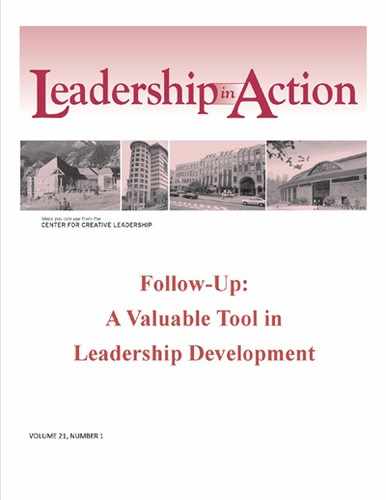Follow-Up: A Valuable Tool in Leadership Development
Jennifer W. Martineau and Judith L. Steed
In many respects, leadership development is like an exercise regimen. To have the best chance of success, each should be approached as a process rather than an event.
The observations of researchers and trainers at the Center for Creative Leadership and the experiences of CCL's clients indicate that although distinct leadership-building events do occur, leadership development takes place over time. In both leadership development and fitness training, periodic measurement helps people to know where they are, to see whether they are heading where they want to go—from their own perspective and from that of others. Leadership development is best achieved through a skillful combination of experiences (such as attending programs and participating in developmental exercises) and constructive follow-up evaluations (such as periodic assessments, tracking the continuous setting and completion of goals, and ongoing feedback).
Since its beginnings in the early 1970s, CCL—which has never subscribed to the theory that leaders are born, not made—has worked to better understand effective leadership so as to better develop it.
Through most of its history, CCL has focused on the development of individual leaders through self-awareness and behavioral change. Especially in the past decade, two important questions have emerged from those who design and conduct leadership development programs at CCL and from those who participate in them:
- Do leadership development interventions create a lasting impact beyond the immediate increases in self-awareness and changes in leadership behaviors?
- What factors contribute most to successful and lasting impacts?
It's not uncommon to hear from participants in CCL's Leadership Development Program (LDP)® and other weeklong interventions that “this has been a wonderful experience, but what can I do to ensure I will be able to use it when I get back to work?” One of the biggest challenges for both CCL and program participants, then, is finding a way to transfer what happens during the programs to the workplace. CCL knows from research and practice that event-driven developmental experiences are not as likely to have long-term impact as are process-oriented experiences.
People who attend one-week training programs will derive the most benefit when they follow up with related activities such as on-the-job training, coaching, and assignments. Why? The main reason is that they are using and evaluating what they learn. One way to extend the developmental experience is through periodic follow-up, which we examine in this article. We will focus on a specific type of follow-up—assessment instruments and surveys.

